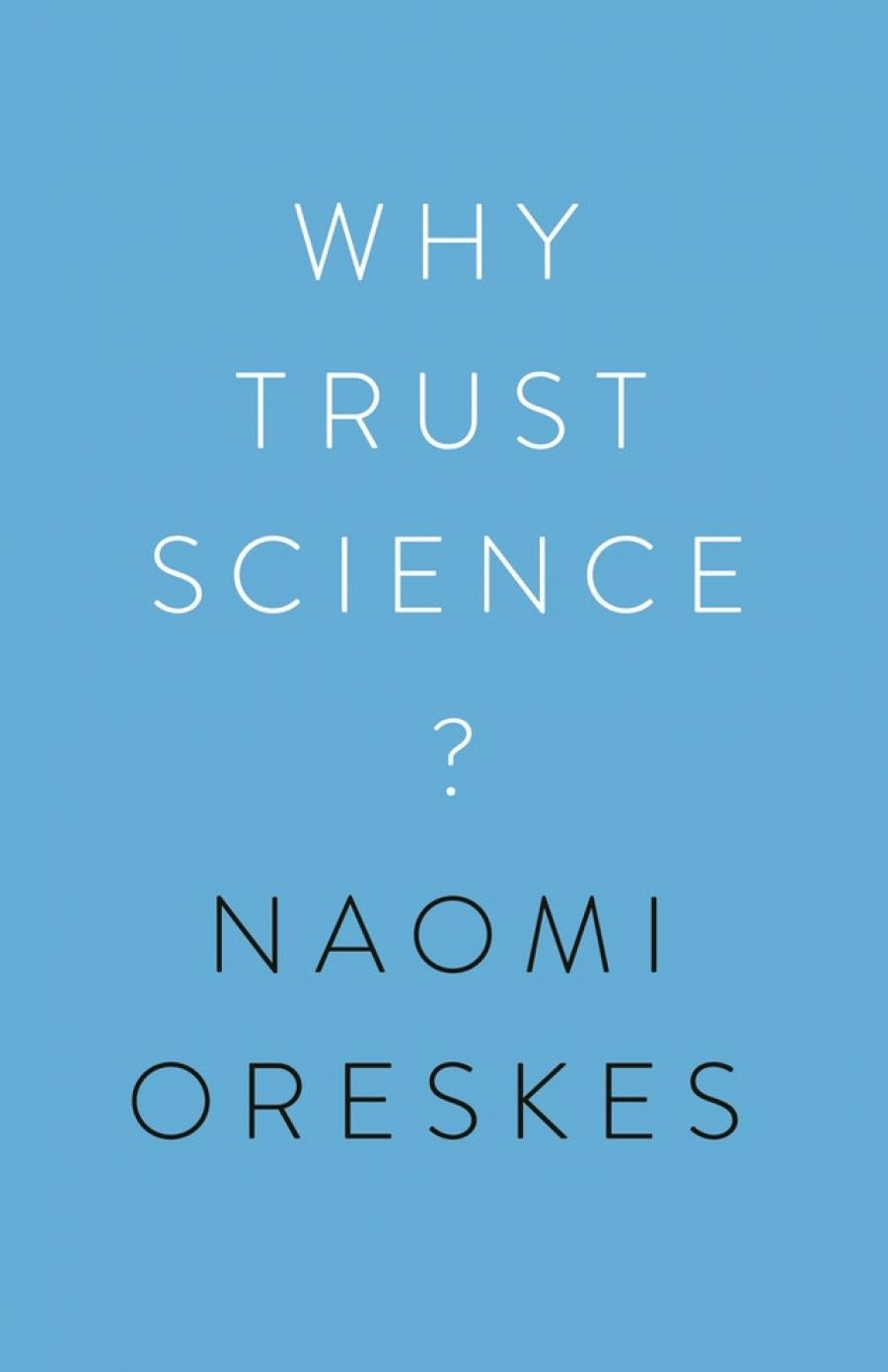
- Free Article: No
- Contents Category: Science and Technology
- Review Article: Yes
- Custom Highlight Text:
In lectures delivered at Princeton University in November 2016, science historian Naomi Oreskes asked why, at a time when the epistemological and cultural relevance of science is subject to increasing doubt, we should still have confidence in science as our primary source of knowledge about the physical world. Why Trust Science? is the culmination of those lectures, and includes not only Oreskes’s appraisal of the scientific method but also four commentaries on the lectures. It is a work predicated, rightly or wrongly, on the assertion that the eminence of science ‘can no longer be maintained without argument’.
- Grid Image (300px * 250px):

- Book 1 Title: Why Trust Science?'
- Book 1 Biblio: Princeton University Press (Footprint), $49.99 hb, 370 pp
In Merchants of Doubt (2010), co-authored with Erik M. Conway, Oreskes forcefully established the degree to which the science around smoking, ozone depletion, and climate change was, and continues to be, manipulated by political and economic interest groups. Here, however, Oreskes’s defence of scientific authority smacks of faint praise; a vindication that is haphazard and ultimately unconvincing.
Beginning with the eighteenth-century notion of the ‘man of science’, and traversing the philosophies of Auguste Comte, Karl Popper, and Thomas Kuhn (among others), Oreskes surveys the development of science as a method for understanding and interpreting nature. While her acknowledgment of observation, theory, and experiment as the central drivers of science is crucial, the connection between Oreskes’s review of the history and philosophy of science and her conclusion – that we should trust science because of the consensual means by which it advances knowledge, and because of ‘its sustained engagement with the world’ – is limited. In truth, much of this material reads like a gratuitous detour (necessary, perhaps, to extend the lectures for publication), one that distracts from the more coherent if cursory arguments she offers regarding science’s expertise, its system of peer review, and its ability to self-correct.
It is this latter aspect that Oreskes explores in her second lecture. If science was so wrong in its embrace of, for example, eugenics or limited energy theory (which argues that women should not pursue higher education lest they diminish the energy available to them for reproduction), how can we be sure that science is not also wrong now when it advocates for vaccination regimens or action on climate change? Oreskes seeks to demonstrate that objections to now-contentious theories were not as muted as we might suppose (eugenics), or that it was not so much science that went awry as the ways in which the science was represented in the media (dental floss), but her arguments are at best ineffective and at worst a salve for doubters. For example, in her discussion of the rejection of continental drift, she signals that resistance to the theory was bound up in the anti-European ‘political ideals’ of the American scientific community. Similarly, her examination of scientific opposition to eugenics suggests that much of this opposition was politically motivated: left-wing scientists challenged eugenics not solely because of the scientific weakness of the argument but because they were certain that any program of eugenics would not be applied equally across social classes. In both cases, what begins as a defence of science only serves to imply the degree to which science may be steered – for good or ill – by social and political considerations.
The four commentaries on Oreskes’s lectures are drawn from the history and sociology of science, philosophy, economics, public policy, and social psychology. (Which begs the question, why wasn’t a working scientist offered the chance to respond?) Each offers its own solution to the trust deficit that science is facing: a greater emphasis on the impact science has on our daily lives; more openness between government and scientists in the development of public policy; improvements in science communication; and a solution to the recurrent problems around the replicability of scientific findings. The overall tenuousness of these responses is captured in the confession of the social psychologist: ‘My observations … are mostly speculations. Everything I have said could be wrong. But I might be right as well.’
The perspectives offered on science in these commentaries – and, it must be said, in the book as a whole – seem merely peripheral to the fundamental problem that science currently faces: that we are living in a post-truth world where facts are too readily at the mercy of ideological imperatives (something to which Oreskes only fleetingly alludes). Further, no attempt is made to situate the diminished authority of science within a broader context, one in which many of the traditional bastions of authority – the political/ruling classes; the media – are similarly under threat.
Why Trust Science? is not without its merits. Oreskes is right to stress the value of diversity in the practice of science, while also underscoring a distinction between the (desired) objectivity of science and the individual flaws and biases of those working within it. Her gesture towards the importance of scientific literacy if we are to overcome the ignorance that politicians (among others) are happy to exploit is welcome, as is her recognition of the harm that ensues when doubt and denial are normalised, although she fails to give either issue the weight it deserves
It is difficult to identify the audience Oreskes envisages for this book. She grants that ‘more scientific research is unlikely to settle the matter [of why we should have confidence in science], because non-scientific objections are not driven by scientific considerations and therefore will not be resolved by more scientific information’. Nevertheless, that is precisely what she seems to be reaching for here. Reading Why Trust Science?, one has a nagging sense that Oreskes has applied herself to the wrong question. More concerning, the weakness of her advocacy is likely to do little to inoculate science from the destructive advance of anti-science.


Comments powered by CComment